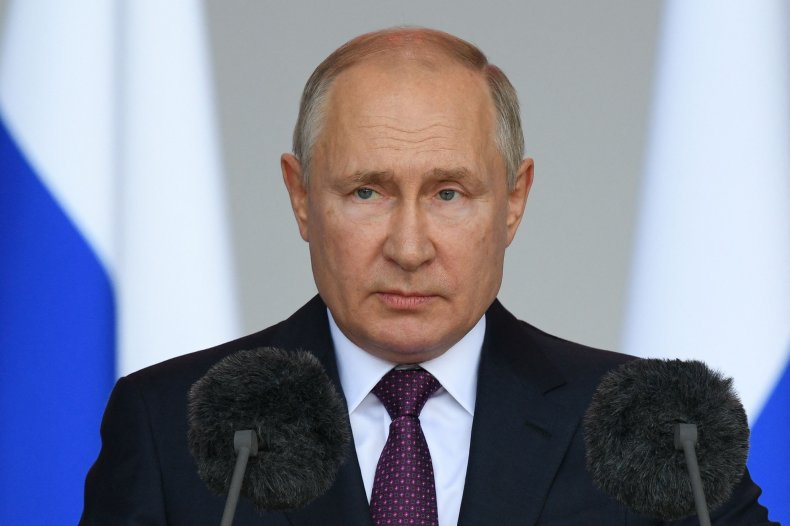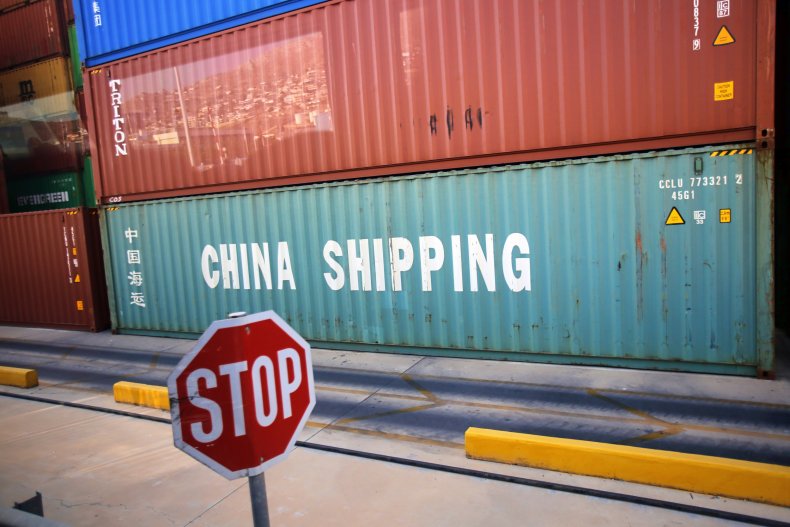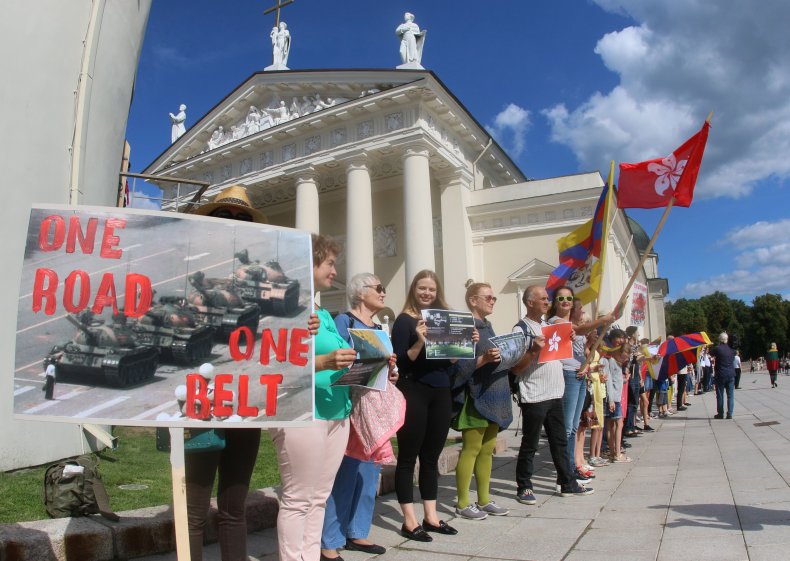DAVID BRENNAN
President Joe Biden's administration must not lose sight of the threat posed by Russia amid America's new focus on rising China, top diplomats in the Baltic states have warned.
In exclusive interviews with Newsweek, Latvian Foreign Minister Edgars Rinkēvičs, Estonian Foreign Minister Eva-Maria Liimets, and Lithuanian Foreign Affairs Vice Minister Mantas Adomėnas said the U.S. and its NATO allies must stay alert to challenges from both Moscow and Beijing or risk encouraging fresh aggression.
"While addressing one challenge, let's not forget about another," Rinkēvičs told Newsweek. "Otherwise one morning we are going to wake up with a very unpleasant surprise, and then we will be again trying to understand who missed what."
Adomėnas explained: "Russia is a short- to medium-term threat that is extremely important. But the systemic challenge to our democratic way of life which comes from China is something that cannot be ignored."
The Baltic states sit on the West's frontline with Russia. Long targets of Russian meddling, hybrid warfare and espionage, Baltic leaders know better than most that Russia still poses a potent threat.
President Vladimir Putin and his allies are entrenching their authoritarianism in Moscow, appear willing to launch brazen attacks against dissidents abroad, are expanding their cyber operations' reach, and are investing heavily in Russia's conventional military.
The Kremlin is maneuvering for more influence abroad and has secured prime energy leverage with the Nord Stream 2 pipeline, soon to begin operations despite fierce opposition from the Baltic states, Washington, D.C. and Ukraine.
"The U.S. should keep strong strategic attention focused not just on one point across the Pacific, but also in the east of Europe," Adomėnas said.
Rinkēvičs added: "I do hope that the current U.S. administration and European Union countries will not forget about challenges that Russia poses.
"There are some people, in the European Union but also across the Atlantic Ocean, saying we can engage Russia more to balance China; that's where I see some certain naivety."
Estonian Foreign Minister Eva-Maria Liimets told Newsweek that continued U.S. focus in Eastern Europe is a priority for Tallinn.
"Our focus at the moment is very much on NATO, and the NATO strategic concept that would assess the current security situation properly and provide working methods for the organization to couple with this security situation," Liimets told Newsweek.
"In all these areas we cooperate a lot with the U.S., and explain to them how we see the security situation and concerns in our region... For us it's also of importance that the U.S. continues its presence and continues to be interested in developments in Europe."
 Russian President Vladimir Putin delivers a speech during the opening ceremony of the International Military-Technical Forum "Army-2021" in Kubinka outside Moscow, Russia, on August 23, 2021.RAMIL SITDIKOV/SPUTNIK/AFP VIA GETTY IMAGES
Russian President Vladimir Putin delivers a speech during the opening ceremony of the International Military-Technical Forum "Army-2021" in Kubinka outside Moscow, Russia, on August 23, 2021.RAMIL SITDIKOV/SPUTNIK/AFP VIA GETTY IMAGESGoods Versus Values
The China challenge cannot be avoided. Beijing's state-backed companies have already reached across Europe, through massive investment and tantalizing trade opportunities—much of it as part of Beijing's multi-trillion dollar Belt and Road Initiative—bringing with them Chinese Communist Party soft power and the beginnings of political and economic coercion.
Chinese investment in Europe could pose a threat to EU and NATO security. Chinese firms are investing heavily in infrastructure, for example gaining control of the Piraeus port in Greece. Chinese money brings strategic problems.
At a summit in London in 2019, NATO first explicitly mentioned China in its joint declaration. For some, China poses the next great challenge for the Cold War-era alliance.
"We are spending more and more time debating China," said Rinkēvičs of EU and NATO discussions. "It's part of our regular business. It's not about should we, it's about how should we approach this? What's the role? What can we do to strengthen our defenses?
"I think that we are moving to a more common understanding, but I think that we still have some distance to travel... We cannot expect that all of us will change our approaches in one day or one month.
"This—like it or not—is a matter of process. The EU consists of 27 nations with sometimes very different ways of looking at what our national and common European interests are."
No European nation has been immune to the promise of Chinese riches, and the EU pillars of Germany, Italy and France—plus the freshly Brexited U.K.—have led the charts in overall Chinese foreign direct investment for decades.
But this wealth could have an outsized impact in Europe's poorer states, particularly appealing to leaders in Central Europe and the Balkans that might be less committed to the traditional EU ideologies of transparency and liberal democracy.
The 16+1 group—17+1 until Lithuania's withdrawal in March 2021— is a decade-old project developed by the Chinese Ministry of Foreign Affairs to promote business between Beijing and 16 European nations in Central and Eastern Europe.
Russia Told U.S. It Won't Abuse Nord Stream 2. Baltic Allies Don't Buy It
To date, the 16+1's list of projects include highways in Serbia, railways in Hungary, a bridge in Croatia, and a raft of infrastructure investments in Poland.
Withdrawing in May, Lithuania's foreign minister urged European nations not to split the EU to deal with China.
"From our perspective, it is high time for the EU to move from a dividing 16+1 format to a more uniting and therefore much more efficient 27+1," Gabrielius Landsbergis said.
Adomėnas described the 17+1 project as one made up of "big promises" but with little substance. "Members of the 16+1 format in most cases traded geopolitical credibility for pretty much nothing in return," the Lithuanian diplomat explained.
"Collectively as the EU, we would have better bargaining power with China than in formats which are created in order to divide and weaken by allegedly providing some sort of privileged access," said Adomėnas. "The funny thing is that has almost never materialized."
Rinkēvičs told Newsweek European nations too often leave human rights issues to be dealt with by EU bodies, while still pursuing investment and trade on a bilateral basis. "When it comes to bilateral relations very often members forget or are not so focused on human rights, democratic principles and rule of law issues," he explained.
"That's very dangerous because that actually fuels the notion for Chinese and Russian diplomacy of: 'Let's strive toward more of these capitals, let's try to break this unified approach, let's try to break the common European foreign policy.'"
Lithuania's recent spat with China is an example of how quickly bilateral relations can deteriorate.
After withdrawing from the 17+1 in May, Lithuania approved a "Taiwan" representative office in Vilnius, infuriating Beijing which prefers to use the word "Taipei" and is fiercely opposed to any suggestion of the island's independence from mainland China.
China recalled its ambassador and demanded that Vilnius withdraw its envoy. Belt and Road Initiative freight train services stopped running to Lithuania, and new food export licenses to China were suspended for Lithuanian suppliers.
The Lithuania-China spat is "a great lesson for us to be very, very careful," said Rinkēvičs. "It doesn't mean that we don't see any value in having economic relations. But I would say that we need to be very careful."
 Rows of colored shipping containers are seen at the freight terminal at Piraeus port, operated by Piraeus Container Terminal SA (PCT) on October 19, 2018 in Piraeus, Greece. Chinese firms are investing heavily in infrastructure, for example gaining control of the Piraeus port in Greece.MILOS BICANSKI/GETTY IMAGES
Rows of colored shipping containers are seen at the freight terminal at Piraeus port, operated by Piraeus Container Terminal SA (PCT) on October 19, 2018 in Piraeus, Greece. Chinese firms are investing heavily in infrastructure, for example gaining control of the Piraeus port in Greece.MILOS BICANSKI/GETTY IMAGES'Two Visions for the World'
Vilnius has refused to be cowed. Lithuania has donated COVID-19 vaccines to Taiwan, offered visas to Hong Kongers fleeing the Chinese Communist Party (CCP) crackdown on the city's semi-autonomy, and urged consumers to throw away Chinese-made Xiaomi smartphones.
"I think recent months have shown that you cannot do economic exchanges with countries that do not respect international agreements, that do not respect property rights, and that are not averse to using any leverage for political ends," Adomėnas said.
"People who trade with authoritarian regimes should be aware that at some point everything has a cost. Higher profits also have their cost, which may not be obvious but are inbuilt into the very model.
"I'm not saying that trading with China should be avoided at all costs. I'm saying that when trading, and getting our supplies, and receiving investment, we should be aware of the inevitably political nature this mix can acquire."
The Chinese threat is among the few issues that seem immune to America's partisan divide. Recent years have seen bipartisan support for a tougher diplomatic line on Beijing, greater scrutiny of CCP human rights abuses, a more wary trade relationship, and more assertive military stance in flashpoints including the South China Sea.
Former President Donald Trump's administration was the most hawkish on China in recent history. Trump and his top officials regularly pushed their European allies towards more China-skeptic positions, for example regarding telecommunications giant Huawei.
European leaders were not always amenable. While condemning Chinese abuses, the EU has also pursued a giant investment deal with Beijing despite opposition from Washington, D.C.
The EU has often appeared stuck in the middle of the simmering China-U.S. confrontation. "I don't think it's a question of the American, or European, or Chinese side," said Adomėnas, when asked whether the EU should take a side.
Donald Trump Era Left NATO Stronger, Baltic Allies Say
At some point, he suggested, Europeans have to choose a vision. "Democracy, rule of law and human rights, or total surveillance and population control with one-party rule," Adomėnas said.
"The dividing line between China and Russia on the one hand, and Europe and the U.S. on the other side, is considerably deeper and broader than the differences that the U.S. and EU may have as democratic organisms."
Russia's threat lies with its nuclear arsenal, its large conventional forces, its hybrid warfare credentials, and its vital energy supply to Europe. But much like the Soviet Union during the Cold War, China's growth poses an existential political debate.
"The Chinese do not consider themselves in a cul-de-sac of historical development," Adomėnas said. "They think they are the response to democracy's weakness, irresoluteness, a certain level of chaos and the impossibility of taking rapid strategic decisions and long-term decisions...They think they're the answer.
"There is a fundamental debate here over which system is going to prevail."
"[The Cold War] was a battle of two visions for the world. And I think we may be at the beginning of another confrontation or standoff, where two visions of how the international order is going to develop will have to be decided."
The U.S. and the EU have already long been grappling with strong anti-democratic currents. Some leaders might see Chinese-style one-party rule as more appealing than the bickering, uncertainty and short-termism of liberal democracy.
"I hope that doesn't happen that way," Adomėnas said. "I very much hope that the countries in Europe which are fascinated by the Chinese model will have the courage and resources to return to the foundational values of the EU."
 People take part in a human chain as part of the "Hong Kong Way" protest in Vilnius, Lithuania on August 23, 2019.PETRAS MALUKAS/AFP VIA GETTY IMAGES
People take part in a human chain as part of the "Hong Kong Way" protest in Vilnius, Lithuania on August 23, 2019.PETRAS MALUKAS/AFP VIA GETTY IMAGES
No comments:
Post a Comment